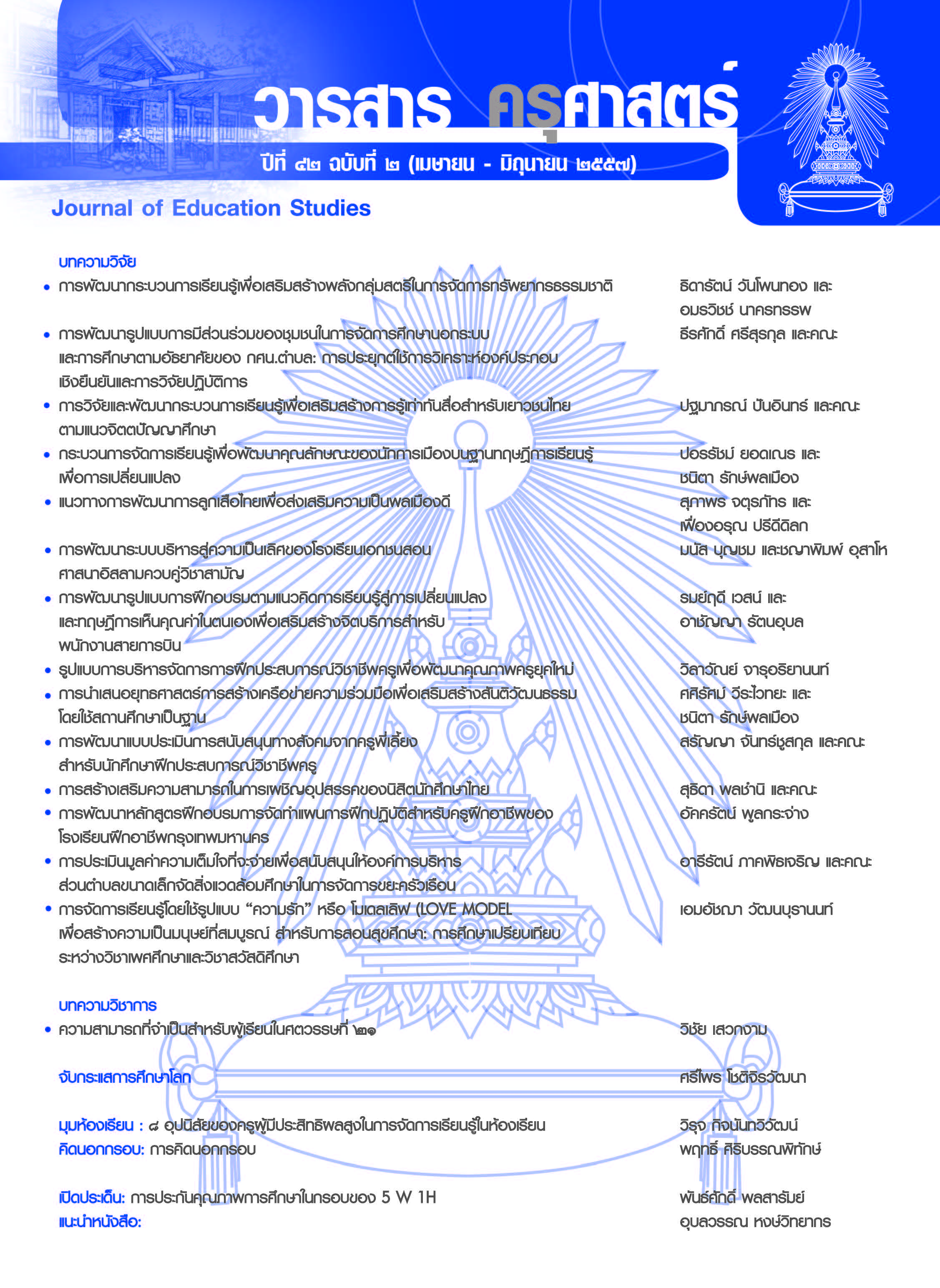การพัฒนากระบวนการเรียนรู้เพื่อเสริมสร้างพลังกลุ่มสตรี ในการจัดการทรัพยากรธรรมชาติ
Keywords:
กระบวนการเรียนรู้, การเสริมสร้างพลัง, กลุ่มผู้หญิง, การจัดการทรัพยากรธรรมชาติ, LEARNING PROCESS, EMPOWERMENT, WOMEN, NATURAL RESOURCE MANAGEMENTAbstract
การวิจัยนี้มีวัตถุประสงค์ ๑) เพื่อศึกษากระบวนการเรียนรู้ของกลุ่มสตรีในการจัดการทรัพยากร ธรรมชาติ ๒) เพื่อวิเคราะห์ปัจจัยเงื่อนไขกระบวนการเรียนรู้ และ ๓) เพื่อพัฒนากระบวนการเรียนรู้ เพื่อเสริมสร้างพลังกลุ่มสตรีในการจัดการทรัพยากรธรรมชาติ มีวิธีการดำเนินการวิจัย ๒ วิธี คือ การวิจัย เชิงคุณภาพ คือ ๑) กลุ่มสตรี บ้านทุ่งยาว ตำบลศรีบัวบาน อำเภอเมือง จังหวัดลำพูน และ ๒) กลุ่ม สตรี สมาคมคนทาม เขื่อนราษีไศล อำเภอราษีไศล จังหวัดศรีสะเกษ และใช้วิธีวิจัยเชิงปฏิบัติการแบบ มีส่วนร่วม มาปรับใช้กับพื้นที่ที่ ๓ คือ กลุ่มสตรีบ้านม่วงชุม ตำบลครึ่ง อำเภอเชียงของ จังหวัดเชียงราย โดยใช้วิธีสัมภาษณ์เชิงลึก สัมภาษณ์กลุ่มและจัดอภิปรายกลุ่มย่อย และสังเกตการณ์อย่างมีส่วนร่วมและ ไม่มีส่วนร่วม
ผลการวิจัยพบว่า ๑) กระบวนการเรียนรู้ในการจัดการทรัพยากรธรรมชาติของกลุ่มสตรี บ้านทุ่งยาวและกลุ่มสตรีสมาคมคนทาม มีขั้นตอนกระบวนการเรียนรู้ที่เหมือนกัน ดังนี้ (๑) การร่วมกำหนด เป้าหมาย (๒) การร่วมกำหนดแนวทางเลือกเพื่อให้ไปสู่เป้าหมาย (๓) มีการวางแผนร่วมกัน (๔) มีการ ปฏิบัติแบบมีส่วนร่วม (๕) มีการสรุปบทเรียน และ (๖) มีการถ่ายทอดองค์ความรู้ ๒) ปัจจัยที่เหมือนกัน ของ ๒ กรณีศึกษา มีปัจจัยภายใน ได้แก่ (๑) ครอบครัว (๒) ผู้รู้ในชุมชน และ(๓) คนในชุมชน/สมาคม ปัจจัยภายนอก ได้แก่ (๑) องค์กรพัฒนาเอกชนและ (๒) องค์กรเครือข่าย และทั้ง ๒ กรณีศึกษามีเงื่อนไข ที่เหมือนกัน คือ แนวทางการพัฒนาของรัฐ ๓) กระบวนการเรียนรู้เพื่อเสริมสร้างพลังกลุ่มสตรีในการ จัดการทรัพยากรธรรมชาติ เป็นกระบวนการเรียนรู้จากฐานประสบการณ์และฐานของปัญหา มีขั้นตอน กระบวนการเรียนรู้ ดังนี้ (๑) เรียนรู้ปัญหา (๒) รวมกลุ่ม (๓) ร่วมค้นปัญหา (๔) ร่วมวิเคราะห์ทางเลือก และกำหนดแนวทาง (๕) ร่วมวางแผน (๖) ร่วมปฏิบัติร่วม (๗) ร่วมถอดบทเรียน และ (๘) ร่วมถ่ายทอด โดยมีเนื้อหา/องค์ความรู้สำคัญ คือ ความเข้าใจถึงความสัมพันธ์ระหว่างตนเองกับทรัพยากรธรรมชาติ ซึ่ง มีเงื่อนไข ได้แก่ (๑) บริบทของพื้นที่ (๒) ความสนใจ (๓) แนวทางการพัฒนาของสังคมไทย
The aim of this thesis is to 1) f ind the learning processes of groups of women in natural resource management; 2) analyze the factors and conditions of learning process which empower groups of women in natural resource management; and 3) develop a learning process to empower groups of women in natural resource management. Qualitative methodology was employed in collecting data. The study examined two cases studies: 1) A group of women at Ban ThungYao, Tambon SriBuaBann, Amphoe Muang, Changwat Lamphun, and 2) A group of women from Taam and People Association, Rasrisalai Dam, Amphoe Rasrisalai, Changwat Srisaket. The summary results of these two case studies were accordingly applied using Participatory Action Research (PAR) to a group of women at Baan MuangChum, Tambon Kring, Amphoe ChiangKhong, and Changwat ChiangRai.
The research outcomes can be summarized as follows: 1) The learning processes to empower groups of women in natural resource management from the two case studies have six similar processes of learning: (1) specifying a target group, (2) determining promising options for completion, (3) collaborating in making an action plan, (4) participating in group work, (5) summarizing learning outcomes, and (6) transferring knowledge. 2) Similar factors between the two case studies can be seen from both internal and external factors. The same internal factors are: (1) families, (2) key informants in a community, and (3) inhabitants in a community. The similar external factors are: (1) NGOs, and (2) networking corporations. The same condition in contributing to the group learning process of these two case studies is the government’s development policy. 3) The development of learning processes to empower groups of women in natural resource management is the process of learning from the experience-based and problem-based approaches. These approaches consist of (1) problem exploring, (2) group networking participation, (3) identif ication of common problems, (4) determination of alternatives, (5) participation in planning, (6) performing participation, (7) lesson learned, and (8) knowledge transference. These approaches relate to the relationship between participants and natural resources subject to area contexts, interesting aspects, and Thailand’s development policy.




